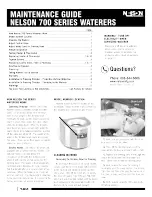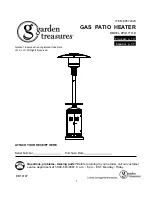
18
INSTALLATION REQUIREMENTS
CHEMICAL VAPOR CORROSION
Corrosion of the flueways and vent system may occur if air for
combustion contains certain chemical vapors. Such corrosion may
result in failure and risk of asphyxiation.
Spray can propellants, cleaning solvents, refrigerator and air
conditioning refrigerants, swimming pool chemicals, calcium
and sodium chloride (water softener salt), waxes, and process
chemicals are typical compounds which are potentially corrosive.
Do not store products of this sort near the heater. Also, air which is
brought in contact with the heater should not contain any of these
chemicals. If necessary, uncontaminated air should be obtained
from remote or outside sources. The limited warranty is voided
when failure of water heater is due to a corrosive atmosphere. (See
limited warranty for complete terms and conditions).
WATER PIPING
HOTTER WATER CAN SCALD:
Water heaters are intended to produce hot water. Water heated to
a temperature which will satisfy space heating, clothes washing,
dish washing, cleaning and other sanitizing needs can scald and
permanently injure you upon contact. Some people are more likely
to be permanently injured by hot water than others. These include
the elderly, children, the physically or developmentally disabled. If
anyone using hot water fits into one of these groups or if there is a
local code or state law requiring a certain temperature water at the
hot water tap, then you must take special precautions. In addition
to using the lowest possible temperature setting that satisfies your
hot water needs, a means such as a mixing valve should be used
at the hot water taps used by these people or at the water heater.
Valves for reducing point of use temperature by mixing cold and hot
water are also available:
Consult a Qualified Installer or Service Agency. Follow
manufacturer’s instructions for installation of the valves. Before
changing the factory setting on the thermostat, read the Temperature
Regulation section in this manual.
This water heater shall not be connected to any heating
systems or component(s) used with a non-potable water heating
appliance.
All piping components connected to this unit for space heating
applications shall be suitable for use with potable water.
Toxic chemicals, such as those used for boiler treatment shall
not be introduced into this system.
When the system requires water for space heating at
temperatures higher than required for domestic water purposes,
a mixing valve must be installed.
These water heaters cannot be used in space heating
applications only.
POWER SUPPLY
The water heaters covered in this manual require a 120
VAC, 1Ø (single phase), 60Hz, 15 amp power supply and
must also be electrically grounded in accordance with local
codes or, in the absence of local codes, with the National
Electrical Code, ANSI/NFPA 70.
POWER FLUCTUATIONS AND ELECTRICAL NOISE
The water heater’s control system requires a source of
stable clean electricity for proper operation. Connecting the
water heater to a branch circuit that is subject to fluctuations
in voltage level or electrical line noise such as EMI (electro
magnetic interference) or RFI (radio frequency interference)
may cause erratic control system operation and malfunction.
A high quality power supply filter/suppressor must be
installed if the above conditions exist. Call the technical
support phone number listed on the back cover of this
manual for more information.
NOTE
:
Malfunctions caused by the power supply and the
costs to install power supply filters are not covered under
the limited warranty.
DEDICATED POWER WIRING AND BREAKERS
Dedicated power supply wires, ground wiring and dedicated
circuit breakers often prevent electrical line noise and
should be considered when installing the water heater.
















































